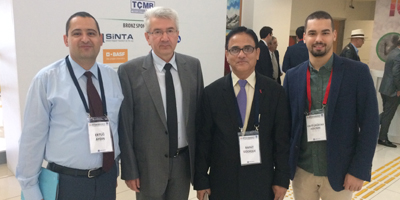EUL Civil Engineering Academician Aydın attending the International Concrete Congress pointed out that any kind of waste can be used at appropriate rates for the concrete sector

Vice Dean of European University of Lefke Faculty of Engineering and the Academician of Civil Engineering Department Assoc. Prof. Dr. Ertuğ Aydın attended the 10th Concrete Congress held in Bursa and presented a notice titled “Alternative Approaches for a Sustainable Concrete Sector”.
Stating that the growth in the construction sector has increased the carbon dioxide emission to a great extent today, Aydın said that although the sustainable concrete sector initiated under the leadership of the United Nations continues to increase, it could not reach the desired level and alternative approaches that would reduce the amount of cement would ensure the sustainability of the concrete sector.
In EUL laboratories, composites consisting of cement paste are prepared by using different waste materials.
Aydın stated that in the EUL Department of Civil Engineering laboratories, composites composed of cement paste using ground ash, marble dust, eggshell and staple wastes are being prepared and added that the aim of the study was to reduce the amount of cement which is the main component of concrete material and to increase the usage of different wastes. Pointing out that as a result of the study, the compressive strength of the composites increased up to 35 MPa and it was observed that the cavity values of the composites prepared using eggshells decreased significantly, Aydın said that it was observed that the strength of the composites obtained by using staples increased significantly and the staple composites showed resistance to rupture and no rupture was observed in the material despite the development of cracks.
Aydın further added that the results of the study show that the strength and void structure properties of the concrete can be improved by using cement paste using different wastes and said that the composite materials prepared can be an alternative for load bearing elements, concrete pipes, road infrastructure, curb, bricks, tiles and decorative purposes and were seen as an ideal ecological material for the construction industry.
Aydın also said that they expect these wastes to be used in clinker production during cement production, which will lead to a significant reduction in environmental damage and provide a high economic profit for the sector.
EUL Department of Civil Engineering attaches importance to alternative approaches for a sustainable environment and construction sector
Pointing out that they have concluded the study under the framework of EUL Department of Civil Engineering’s possibilities, Aydın underlined the importance of applied training that they offer at the Civil Engineering Department and said that they have the best infrastructure to give practical training in the field of Civil Engineering with their modern classrooms and department laboratories. Stating that they use different wastes in the study, Aydın added that all kinds of waste can be evaluated at appropriate rates and that EUL Civil Engineering Department always attaches importance to alternative approaches for a sustainable environment and construction sector.
